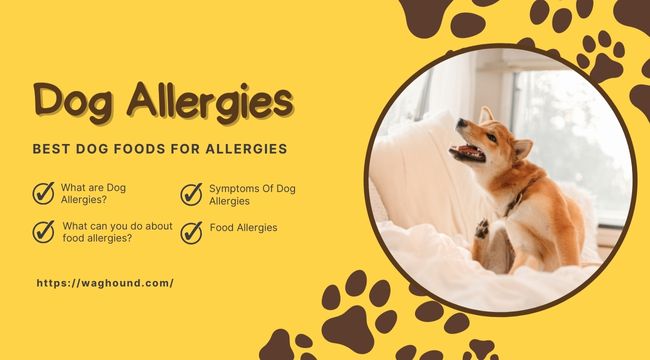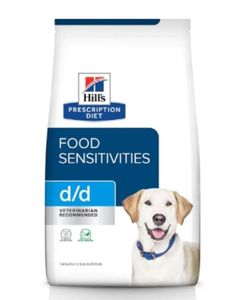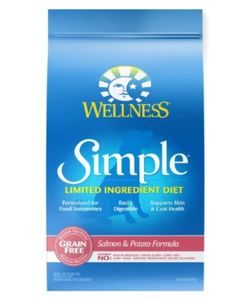
Best dog food for allergies- Our pets are prone to allergies, just like us, and it makes us really sad to see them suffer. As pet owners, we do our utmost to provide the very best to our pets, and hence, we need to understand allergies, their symptoms, and our role so that our pets can overcome their suffering.
While dogs are prone to allergies caused by different sources, food is one of the most common sources of allergies in dogs. Hence, it is important to give your dogs the right food so that they can quickly recover.
Other sources of allergies include fleas, environmental allergens, etc., and below, we have discussed them right after the review section. Keep on reading!
The Best Dog Food for Allergies in 2020
#1. Hill’s Prescription Diet

On top of our list is Hill’s Prescription Diet which has proven to be very effective for dogs with food allergies.
Here is why:
First of all, it is highly recommended due to the fact its protein content comes from a single intact animal, hence significantly nullifying the chances of triggering allergic reactions. In addition to that, even carbohydrates come from a single source.
Put these facts together, and you end up with a product that is easy on the digestive tract.
In addition, it contains high levels of omega fatty acids—that are good for the skin and coat—and antioxidants to help boost your dog’s immune system. And this makes it perfect for dogs with skin allergies—it’s made with this specific purpose in mind.
While this is only the potato and venison formula, there are four different flavors you can choose from the same brand based on your requirements.
#2. Wellness Simple Natural Limited Ingredient Dog Food

The name speaks for itself as to why we have chosen this product as one of the finest dog foods for allergies.
Firstly, it is specially formulated for dogs that have conditions of food sensitivity due to the high-quality protein and flaxseed in the recipe.
Its ingredients include salmon, which is a natural source of vitamins, minerals and Omega fatty acids which are good for nourishing the skin and coat of your dog, keeping it healthy and shiny.
Chicory roots are excellent natural probiotics that help the digestive system to be strong and healthy; making the formula easily digestible.
Summarizing, this brand takes care of your dog’s digestive health, immunity, skin & coat, eyes, teeth and gums and, at the same time giving it high levels of energy.
There are also other flavors to choose from the same brand.
#3. Acana Singles Grain Free Dog Food for Skin Allergies

This is one of the finest grain free dog food for skin allergies that you can get in the stores. Though the price may seem to be higher, they give some seriously good quality meat.
Moreover, it is 50% meat from lamb and the rest 50% is fruits, vegetables, and other probiotics. It is not only dense in protein but, the carbs are also limited, making it an excellent food for your dog’s overall health.
This brand is a safe pick for dogs who have an intolerance to grains.
This is one flavor there are other flavors to choose from depending on your taste.
#4. Rachel Ray Nutrish for Dogs With Allergies

With just six simple ingredients, this product is also a good pick for dogs with allergies.
The ingredients include lamb meal, brown rice, ground rice, beet pulp, chicken fat, and chicken meal. Not very fancy but definitely a decent choice especially because of the high amount of protein in the meal.
Moreover, the added vitamins and chelated minerals make the absorption of nutrients easier.
The formula is free from allergens like grain, corn, wheat & soy, and artificial flavors and preservatives.
Its pricing is also very affordable.
#5. Taste of the Wild Sierra Mountain Grain-Free Dry Dog Food

The market is flooded with dog foods, but buying high-priced stuff may be hard if you’re on a budget. Besides being more affordable, this food still contains ingredients that are suitable for many dogs with allergies.
A family-owned U.S. brand, Taste of the Wild offers lamb and roasted lamb as protein sources. Grain-free recipe with peas and sweet potatoes provides high-digestible energy for your pup, as well as antioxidant support from real fruit and vegetables and prebiotic support from dried chicory root.
However, there are still many fruits and vegetables on the ingredient list. Therefore, if your dog has a reaction to the food, it might be more difficult to figure out what’s wrong.
What are Dog Allergies?
Allergies are an adverse reaction by the immune system to allergens— agents that cause allergies. Since allergens are substances in the environment on a daily basis, if your dog has an allergy to any of them, it can end up causing a lot of discomfort. Why? Well, the immune system wrongly perceives the allergen as a potential threat and, your dog’s body tries to eliminate the allergen from its own system.
Symptoms Of Dog Allergies
While your dog’s body is trying to remove the allergen, you will notice the various allergy symptoms on the skin. Some of the most common symptoms include skin problems like itchy red skin and your dog will be scratching more frequently, sneezing, vomiting, swollen paws, diarrhea etc. Note: We have a beautiful Infographic on dog allergies at the bottom of this article, don’t miss that!
Which Dog Breeds are Prone to Allergies?
The five breeds that are most sensitive and likely to have allergic reactions to a wide variety of irritants are:
- Golden Retriever
- German Shepherd
- Cocker Spaniel
- Boxer
- Bichon Frise
What Kinds Of Allergies Affect Dogs?
The three kinds of allergies that most commonly affect dogs are:
1) Flea Allergy Dermatitis (FAD)
If your dog is allergic to fleas, you will notice your dog will become very uncomfortable and be scratching all the time. While there is a misconception that it’s the flea that is causing the itching reaction, it’s actually reacting to the saliva of the flea.
What can you do when you know the allergy is caused by fleas?
- We suggest you bathe your dog often and comb them every day with a flea comb.
- After the bathing and giving your dog a good brush, use natural pest repellents and apply generously.
- In consultation with your vet, oral drugs can also be administered for a complete cure.
2) Environmental Allergies
Anything in the environment that your dog’s immune system perceives as a threat will trigger an allergic reaction. Really, it could be any one of a number of things, including grasses, pollen, and dust from outside your house and mites, fabrics or even mold from somewhere inside your house. Sometimes, allergies can be seasonal, especially if it is coming from the outside.
What can you do about environmental allergens?
- The first step is determining the allergen itself, which might take some time. After that, a thorough house cleaning, especially getting rid of mites.
- Secondly, give your dog high-quality water and bathe him regularly. A healthy pet is actually a very happy pet and that warms all of our hearts. While bathing your dog, make sure to clean their paws—chances are the buggers are hiding in there.
- It’s always better to consult a vet for expert advice.
3) Food Allergies
This is probably one of the worst forms of allergies and it can come from any source. As owners, we should be attentive and give our dogs the quality dog food, sensitive to food allergies.
If your dog is suffering from food allergies, you will notice itchy skin with red eyes and inflamed ears. Sometimes, you may see nasal discharge (a “running” nose) and swollen paws accompanied by coughing, sneezing or asthma. Vomiting is also a common symptom of food allergies.
One of the biggest challenges you will face is determining what your dog is reactive to. It is not uncommon that as your dog grows older, he/she will develop sensitivities towards something that previously didn’t bother them.
Some Common Food Allergens:
- Grains
- Beef
- Dairy Products
- Chicken
- Lamb
- Fish
- Chicken
- Corn
What can you do about food allergies?
- It’s always right to consult your vet and take an allergy to figure out what your dog’s allergy is specifically.
- Most of the times, your pet doctor will recommend an allergy elimination diet to pinpoint the cause of the reactions.
- This helps in not only identification but also to detox your dog’s gastrointestinal tract.
- Hypoallergenic food is really good to get in these situations; buy raw, homemade brands along with commercial food.
Now, that you know about allergies in dogs, it is a lot of information to remember! We have created this easy to remember visual representation explaining allergies in dogs that you can download and print.
Just stick it on your fridge or any place you find convenient and you are good to go! Don’t forget to share this with other dog owners and dog lovers.

